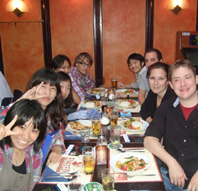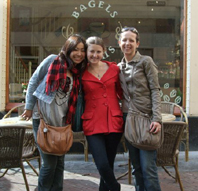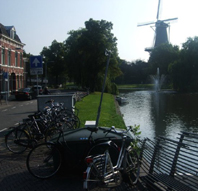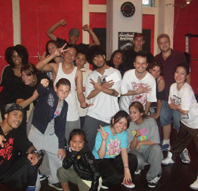Mari Hosho, Exchange Student to Netherlands





-Please tell us the name of the university and department where you studied abroad.
Leiden University (Netherlands).
Psychology major.
-Please tell us why you first thought about studying abroad.
My two requirements for the place to study were whether the place is unfamiliar to most Japanese students and whether the university offers diverse and interesting psychology classes.
Personally, I think one year is never enough to actually achieve something. I thought the length of time was just enough to experience the new taste of life. In my case, I had many friends who study in the United States, the United Kingdom, Canada and many other English spoken countries. Therefore, I wanted to choose a place where people rarely go.
Leiden University is very well-known in the field of Japanese studies, law and social psychology. Especially in the department of psychology, there seemed to be many classes from diverse fields of psychology available for exchange students. It also teaches in English, which is rare in non-English speaking countries. I had wanted to study psychology as my major because I had been curious of how people identify themselves in a community. Also I was interested in supporting people’s mental health in medical institutions. Still, I was doubtful of what I wanted to specialize in and what I am curious of. Therefore, I wanted to take classes from diverse fields in psychology to see which one suits me better.
As I tried to match my preference and the list of universities that had exchange programs with Keio, Leiden University seemed to be the best option available to me.
-Why did you decide to study at your host university?
My two requirements for the place to study were whether the place is unfamiliar to most Japanese students and whether the university offers diverse and interesting psychology classes.
Personally, I think one year is never enough to actually achieve something. I thought the length of time was just enough to experience the new taste of life. In my case, I had many friends who study in the United States, the United Kingdom, Canada and many other English spoken countries. Therefore, I wanted to choose a place where people rarely go.
Leiden University is very well-known in the field of Japanese studies, law and social psychology. Especially in the department of psychology, there seemed to be many classes from diverse fields of psychology available for exchange students. It also teaches in English, which is rare in non-English speaking countries. I had wanted to study psychology as my major because I had been curious of how people identify themselves in a community. Also I was interested in supporting people’s mental health in medical institutions. Still, I was doubtful of what I wanted to specialize in and what I am curious of. Therefore, I wanted to take classes from diverse fields in psychology to see which one suits me better.
As I tried to match my preference and the list of universities that had exchange programs with Keio, Leiden University seemed to be the best option available to me.
-Please tell us about some of the aspects of your life abroad.
Throughout my life in Leiden, everything had been unexpected. Nevertheless, it was way more exciting and fun than I had ever imagined.
I think I’ve been through many more troubles than most exchange students.
Still, I was able to grow as a person. Because of a mistake in my contract, I couldn’t get into my housing for the first two weeks. I was supposed to move into my new room on August 16, 2011, but something went wrong and my contract was scheduled to start from September 1st, 2011. Naturally, I panicked, but Dutch people (especially those who are studying Japanese as a major) helped me out through the rough times. It had been a very new experience for me.
Leiden is a town of students. Most people who came to Leiden as exchange students were quite older than me. Many of the exchange students were from other European countries, including Slovakia, Slovenia, Italy, Spain, Ireland and many others. We often had gatherings and parties where they would cook their traditional meals, travelled together and helped each other. Generally, they have concrete goals and are motivated to strive forward for their dreams. They have taught me that getting into a good university and good company is not the only choice for my future. They are really relaxed and optimistic about their career plan. They focused more on the present, about who they are than worrying about the future. Partially because I was the youngest, however, I was able to learn and absorb a lot from them about what I can do in life.
Finally, Leiden is a blessed town geographically. It is the midpoint between Amsterdam and Rotterdam, two important cities in the Netherlands. Most places are accessible within an hour by train. I was able to take many classes in psychology. However, because of the limit that European universities imposed, I had classes twice or three times a week. Therefore, I learned how to make the most out of the time given. Aside from studying and reviewing from class, I decided to go sightseeing in and out of the Netherlands. It was easy for me to do that because of the good location.
To be honest, I thought living in the Netherlands would be too peaceful and less exciting. However, there were so many discoveries after arriving there and within a week my first impression toward the Netherlands changed completely. I am glad that I was able to spend 10 months of my life in Leiden.
-What are differences you have noticed between Keio and your host university?
Actually, there are quite many similarities between Keio and Leiden University. Especially since my campus in Shonan Fujisawa is in the suburb area of Kanagawa, the size of the town may be similar to that of Leiden. Still there were many major differences between these two. The biggest difference would be students who study there.
In Leiden University, I thought the students were more independent and responsible about what they were doing. For example, if they have decided to skip a class, they can actually explain logically about their priorities and how their decision leads to skipping class. Because they come to class or do something out of motivation, students are more passionate about what they are studying. It may be based on Dutch culture that respects freedom of individuals’ choices that they can do whatever they want. From my observation, there are hardly any students who are anxious of their future and apply for jobs during the college years. Instead, most people go on internships, volunteer work in other countries or study in graduate school after graduation. I liked how students there think and act based on the value of enriching their lives with wide range of experience.
At Keio University, most students are between the ages of 19 to 22. It may be because of the young age, but students seemed to enjoy their social life more than their studies. They are using their time to the fullest in their own way, but they always seemed to worry about their future, starting to lose the meaning of going to university. They seem to be very busy with projects and activities that they are losing time for themselves. I felt more relaxed hanging out with people in my age here, however, after I came back to Japan I couldn’t understand why they worry about everything so much and pack their schedule to the fullest.
Both universities are good in their own unique way. It is interesting to see how students can tell a lot about a community.
-Please tell us about what you feel you gained by studying abroad.
I cannot imagine what it would be like to stay in Japan during my second and third year. I may be able to create a performance in my dance circle with friends in my grade. There are so many things I had to sacrifice to study abroad alone, mostly time with the people I love. Yet, I gained more than what I had lost.
The best thing I gained was that I became more stable in myself. Before studying in Leiden, I tried everything that interested me even for a bit. As a result, I became overwhelmed and could not prioritize the list of to-dos. I became more confident in what I’ve been doing.
Also my interest had changed. I always wanted to work in psychological field but I was not able to connect my interest and my career vision. I felt like there is a gap between what I want to do from my heart and the impression the word “psychology” has. Through my life in Leiden, however, I learned that I actually like to create and provide people with information and opportunities they can make the most out of their lives. What I loved was not the psychology exactly but listening and sharing people’s life stories. This shift of core value fits better to my feeling, and I learned that I should follow what I honestly want to do and what I am good at. That way, I could learn better about myself.
The last but one of the biggest changes is that I became more strongminded toward adversities. Throughout the 10 months, I became homeless twice, got harsh words, lost some of my closest friends and became doubtful about myself. I often wanted to go home very badly sometimes. However, these rough experiences pushed me forward to read more books, watch more movies and learn from the experience. There were many friends who supported me through the rough times. Since then, I have aimed to be a person who can understand the pain of hardships and become a great friend. Also, since I belonged to a street dance circle back in Keio, I kept on dancing in the Netherlands. Not only did it become a really good way to refresh my mind, but also I was able to meet people I wouldn’t have met had I stayed inside the university, within the community of exchange students. There were many workers, immigrants, artists and professional dancers at the studio where I went. All of them seem to pursue their lives and I admired how their lives were so different from mine.
I cannot list everything I’ve gained in my life in the Netherlands. It makes up who I am today.
-What is your plan after you graduate?
I am interested in working in the human service sector or journalism sector. At first I was going to go to graduate school, majoring in psychology. As I met graduate students in Leiden, however, I realized that it is never too late to start studying or doing something. Also, I realized counseling is something I should do after I’ve gained more life experience. When I was taking a health psychology class, our class was assigned to do a role playing for counseling. I burst out crying when I was playing the role of a counselor, because I became overwhelmed from by the client’s severe condition. I thought that I needed to acquire the skills to control my emotion and analyze the client’s symptom. I would like to develop skills needed in the future through working and communicating with people.
So I decided to experience how working life could be first, and if I still want to study, I will go to a graduate school in North America. Also, I want to earn enough money and skill to achieve my dreams (for example, studying in a graduate school abroad or working abroad in the human service sector).
The season of job application has not started yet, but right now I am preparing myself for job hunting.
-Do you have any advice for students who are considering studying abroad?
It is always frightening to take the next step in life. Especially in the case of studying abroad, you have to create a life from the beginning. You may get into trouble you had never expected before. It may be overwhelming at first, but it also means that you have all the chance to cherish your life abroad. When something good happens, enjoy it to the fullest, and when something bad happens, learn as much as you can from that.
Please never give up when your study does not go as well as you thought it would or there is big difference in culture. Everything will be a laughable story once you have gone through many obstacles. Whatever happens, everything is meant to turn up good.
Also, one thing I’ve always kept in mind is that if most people are heading to one direction, I always chose something that people did not chose. I felt lonely quite often, but in terms of life experience, you have got the chance to see the world that is covered from everyone else. You are free from all the stereotypes and impressions people back home had on you. Someday you have to go back to your home country. So please keep thinking what you can do every day so that you can bring home many stories.
Information about Leiden University
Leiden University is the oldest university in the Netherlands with a good reputation in the Europe. It has seven faculties: archaeology, humanities, medicine, law, social and behavioral sciences and science. It is a university with tradition and history yet still well-known for academic research in medicine, law, Japanese studies, psychology and science. International students comprise 10% of the total number of students.
About the writer
Mari Hosho
Third-year Student,
Faculty of Environment and Information Studies
* The facts are those at the time of the interview.
